
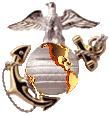

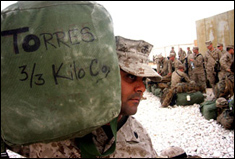
America's Battalion Goes to Iraq
Marine Corps News Roe F. Seigle March 18, 2006
Camp Al Asad, Iraq - Just eight months after their deployment to Afghanistan, Hawaii-based Marines from 3rd Battalion, 3rd Marine Regiment departed Kaneohe Bay, Hawaii, recently to begin their seven-month deployment here in support of Operation Iraqi Freedom.
Now, all of the Marines from the unit – known as “America’s Battalion” – have arrived in Iraq’s Al Anbar Province, which they will call home for the duration of their stay.
After months of training in Hawaii and southern California, the battalion flew in from their home base over the past several weeks to replace the Camp Pendleton, Calif.-based 3rd Battalion, 1st Marine Regiment.
These Marines will be operating in the “Triad” region of Haditha, Haqliniyah, and Barwanah along the Euphrates River in western Iraq, where they will pick up where their predecessors left off – working hand-in-hand with Iraqi Security Forces to conduct counterinsurgency operations on their own and eventually take control of Al Anbar Province.
This latest deployment in support of the Global War on Terrorism comes just eight months after the battalion returned from a combat tour in Afghanistan. About 55-percent of the battalion’s 1,000-plus Marines and sailors deployed with the unit to Afghanistan last year.
The Marines, both veterans and first-time deployers alike, are eager to be here. While waiting for flights and convoys to their destination in Iraq, the Marines’ talk to each other about home, the Marine Corps, what daily life will be like, and a multitude of other subjects to include their mission of assisting the Iraqi Security Forces.
During their down time, the Marines write letters home and talk about their loved ones. In the evening, they receive refresher classes on the rules of engagement, levels of force protection, and other subjects designed to keep them alive and within the laws of war.
All of them seem to be in high spirits considering they are in a combat zone.
“I came here to Iraq to do my part,” said Staff Sgt. Ronnie Torres, 29, Weapons Company platoon sergeant and a native of Pembroke Pines, Fla. “I want to help the Iraqi people settle and have an easier life.”
“I want to be here,” added Lance Cpl. Riley Carter, an intelligence analyst with the battalion. “This is what I came in the Marine Corps to do. Being in Hawaii was nice, but it is time for me to leave paradise and do my part for my country.”
Carter and Torres’ demeanor seem commonplace throughout the battalion’s ranks. In fact, the unit’s commander, Lt Col. Norman Cooling, says the Marines are “motivated and ready to train the Iraqi Security Forces.
“The Marines have trained exceptionally hard for this deployment,” said Cooling. “They have tremendous faith in their leadership and they know that they have had the best training possible.”
“I have no qualms about leaving my life in the hands of my Marines,” said Torres, who said good-bye to his wife, Marcy and their two daughters just days ago.
Prior to arriving in Iraq, the Hawaii-based Marines spent a month and a half of pre-deployment training in southern California’s Mojave Desert – a combined arms exercise appropriately dubbed “Mojave Viper.” The six-week long exercise was a culmination of a multitude of infantry, urban warfare and cultural training for the Marines in preparation for Operation Iraqi Freedom.
From countering improvised explosive devices to patrolling and interacting with Iraqi role players in a mock-Iraqi village, the Marines were put in scenarios similar to those they’ll face in Iraq.
“The Marines are ready for this,” added Cooling. “It takes a very special man to sacrifice his comfort and the comfort of those who he loves most in order to make a difference to his country. That’s the kind of men that serve in this unit – in ‘America’s Battalion.’”
In addition to preparing Iraqi soldiers to eventually take control of security operations in the battalion’s “battle space,” Cooling’s second mission is to ensure he gets his troops home safely. Minimizing casualties is a priority for Cooling, who added that doing so stems from realistic training, having the best equipment available, superb leadership, and keen situational knowledge of the operating environment.
While the infantry unit — called “three-three” for short — has received the best training, equipment and leadership possible, it’s up to individual leaders to ensure they and their subordinates keep up to date on current and future operations, said Cooling.
In a combat environment, staying in the “know” could mean the difference between success and failure, and even life and death.
“That is why a good relief-in-place is so critically important,” said Cooling, who added that his unit’s experience from Afghanistan will play a critical role in the Marines’ ability to effectively help the development of the Iraqi Army.
“We have eight months of practical experience in training a foreign military,” said Cooling. “The 55 percent of the Battalion that remains from Afghanistan knows how to work around language and cultural differences and create a cohesive team with foreign soldiers.”
The battalion has shown they can successfully work side-by-side with other militaries and is capable of training newly-formed forces, said Cooling. The Marines conducted several combined operations with the Afghan Army during their deployment last year and “performed superbly,” he said.
“They (Afghan soldiers) were a significant combat multiplier because the local population recognized them as fellow Muslims with the same language, culture, and to a certain extent, national identity,” said Cooling, a native of Baytown, Texas. “I suspect that the same will be true with regard to the Iraqi soldiers here.”
For some of the unit’s Marines, the next seven months will be their first deployment to Iraq, and for many, the longest time they’ve been away from family and friends. For others, the deployment offers a new experience – the chance to conduct combined operations with foreign militaries.
“It takes spouses who are willing to raise children alone for extended periods and children to go without one of their most important life mentors,” said Cooling. “It’s (deployment) a real sacrifice that few are willing to make. “
The battalion’s deployment is part of a regularly scheduled rotation of forces in Al Anbar Province. More than 23,000 Marines and sailors of the Camp Pendleton, Calif.-based I Marine Expeditionary Force are replacing the Camp Lejeune, N.C.-based II MEF.
Copyright 2006 Marine Corps News.
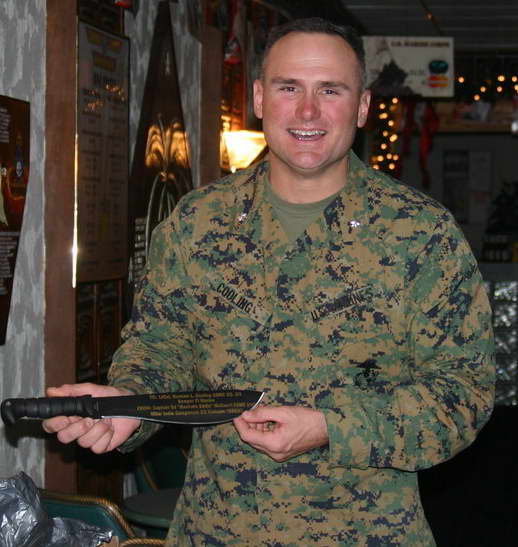
LtCol Norm Cooling with knife given by Ed McCourt (December 2005 29 Palms CA)

AL ASAD, Iraq - Staff Sgt. Ronnie Torres, a 29-year-old platoon sergeant from Kilo Company, 3rd Battalion, 3rd Marine Regiment, based out of Kaneohe Bay, Hawaii, carries his sea bag to his tent after arriving to an airbase March 17. Just eight months after their deployment to Afghanistan, the Hawaii-based Marines have departed their base in Hawaii for a seven-month deployment in support of Operation Iraqi Freedom. “It takes a very special man to sacrifice his comfort and the comfort of those who he loves most in order to make a difference to his country,” said Lt. Col. Norman Cooling, the unit’s commanding officer. “That’s the kind of men that serve in this unit – in ‘America’s Battalion.’ “It’s a real sacrifice that few are willing to make." The Marines will be replacing the Camp Pendleton, Calif.-based 3rd Battalion, 1st Marine Regiment, in the “Triad” region of Haditha, Haqliniyah, and Barwanah along the Euphrates River in western Iraq. The battalion will work hand-in-hand with local Iraqi Security Forces to conduct counterinsurgency operations, as well as advise and guide Iraqi soldiers so they can eventually take operational control of Al Anbar Province. Torres is a Pembroke, Fla., native. Photo by: Sgt. Roe F. Seigle
_________________________________
Lance Cpl. Riley Carter, a 21-year-old Marine intelligence specialist from Taylorsville, N.C., is one of hundreds of Marines and sailors from the Hawaii-based 3rd Battalion, 3rd Marine Regiment who have deployed in support of Operation Iraqi Freedom. Just eight months after their deployment to Afghanistan, the Hawaii-based Marines have departed their base in Hawaii for a seven-month deployment in support of Operation Iraqi Freedom. “It takes a very special man to sacrifice his comfort and the comfort of those who he loves most in order to make a difference to his country,” said Lt. Col. Norman Cooling, the unit’s commanding officer. “That’s the kind of men that serve in this unit – in ‘America’s Battalion.’ “It’s a real sacrifice that few are willing to make." The Marines will be replacing the Camp Pendleton, Calif.-based 3rd Battalion, 1st Marine Regiment, in the “Triad” region of Haditha, Haqliniyah, and Barwanah along the Euphrates River in western Iraq. The battalion will work hand-in-hand with local Iraqi Security Forces to conduct counterinsurgency operations, as well as advise and guide Iraqi soldiers so they can eventually take operational control of Al Anbar Province. Photo by: Sgt. Roe F. Seigle
_________________________________
Marines from 3rd Battalion, 3rd Marine Regiment, take a few minutes to themselves after off-loading and organizing their sea bags, helmets, and other military gear after arriving to an airbase at Al Asad, Iraq, March 17, 2006. Just eight months after their deployment to Afghanistan, the Hawaii-based Marines have departed their base in Hawaii for a seven-month deployment in support of Operation Iraqi Freedom. “It takes a very special man to sacrifice his comfort and the comfort of those who he loves most in order to make a difference to his country,” said Lt. Col. Norman Cooling, the unit’s commanding officer. “That’s the kind of men that serve in this unit – in ‘America’s Battalion.’ “It’s a real sacrifice that few are willing to make." The Marines will be replacing the Camp Pendleton, Calif.-based 3rd Battalion, 1st Marine Regiment, in the “Triad” region of Haditha, Haqliniyah, and Barwanah along the Euphrates River in western Iraq. The battalion will work hand-in-hand with local Iraqi Security Forces to conduct counterinsurgency operations, as well as advise and guide Iraqi soldiers so they can eventually take operational control of Al Anbar Province. Photo by: Sgt. Roe F. Seigle
_________________________________
Cpl. Tyler Cobaley, an armory custodian for Lima Company, 3rd Battalion, 3rd Marine Regiment, spends a few moments with his wife Patricia, under a tree at Marine Corps Base Kaneohe Bay, Hawaii, before saying ‘good-bye’ and deploying to Iraq, Feb. 18, 2006. Just eight months after their deployment to Afghanistan, the Hawaii-based Marines have departed their base in Hawaii for a seven-month deployment in support of Operation Iraqi Freedom. “It takes a very special man to sacrifice his comfort and the comfort of those who he loves most in order to make a difference to his country,” said Lt. Col. Norman Cooling, the unit’s commanding officer. “That’s the kind of men that serve in this unit – in ‘America’s Battalion.’ “It’s a real sacrifice that few are willing to make." The Marines will be replacing the Camp Pendleton, Calif.-based 3rd Battalion, 1st Marine Regiment, in the “Triad” region of Haditha, Haqliniyah, and Barwanah along the Euphrates River in western Iraq. The battalion will work hand-in-hand with local Iraqi Security Forces to conduct counterinsurgency operations, as well as advise and guide Iraqi soldiers so they can eventually take operational control of Al Anbar Province. Photo by: Sgt. Roe F. Seigle
_________________________________
Gunnery Sgt. Roger Kraft, company gunnery sergeant for Lima Co., 3rd Battalion, 3rd Marine Regiment, packs his gear with his wife’s help Feb. 17, 2006, at his residence on Marine Corps Base Kaneohe Bay, Hawaii, before deploying the next day to Iraq. Just eight months after their deployment to Afghanistan, the Hawaii-based Marines have departed their base in Hawaii for a seven-month deployment in support of Operation Iraqi Freedom. “It takes a very special man to sacrifice his comfort and the comfort of those who he loves most in order to make a difference to his country,” said Lt. Col. Norman Cooling, the unit’s commanding officer. “That’s the kind of men that serve in this unit – in ‘America’s Battalion.’ “It’s a real sacrifice that few are willing to make. “ The Marines will be replacing the Camp Pendleton, Calif.-based 3rd Battalion, 1st Marine Regiment, in the “Triad” region of Haditha, Haqliniyah, and Barwanah along the Euphrates River in western Iraq. The battalion will work hand-in-hand with local Iraqi Security Forces to conduct counterinsurgency operations, as well as advise and guide Iraqi soldiers so they can eventually take operational control of Al Anbar Province. Kraft is a native of Jacksonville, N.C. Photo by: Sgt. Roe F. Seigle
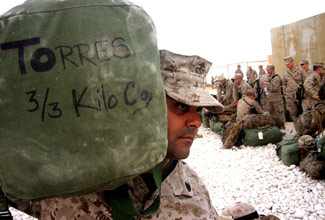
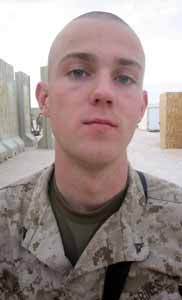
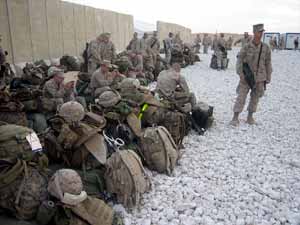
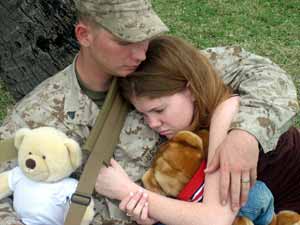
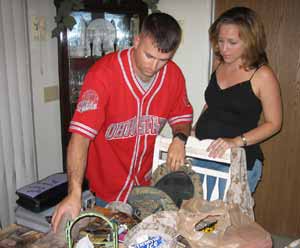
Note: This is not an official website. It's purpose is to support Marines of 3/3.
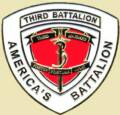
Dec 20, 2005 29 Palms CA
17 of our 3/3-Nam Alumni gathered with the Companies of 3/3 at the completion of their training at 29 Palms in December 2005, in continuance of our support for our Marines.
We were in awe of these young warriors. They are superbly trained and motivated, with outstanding leadership at all levels.
We were able to spend a few hours mingling with them, and it was the experience of a lifetime.
Our 3/3 legacy of America's Battalion is in the finest of hands!
We will work to gather a group to welcome them home upon their return from Iraq later this year [2006].
Semper Fi